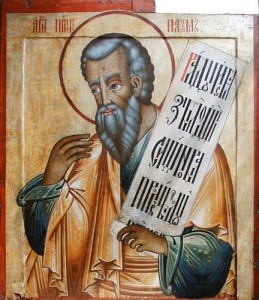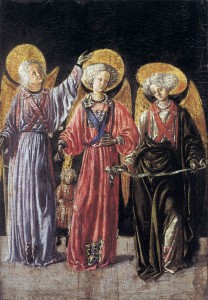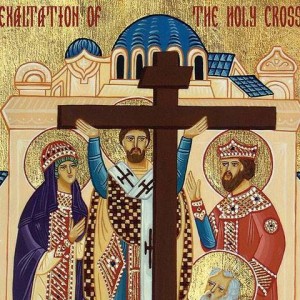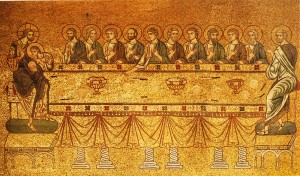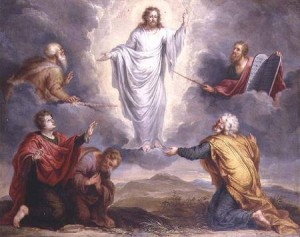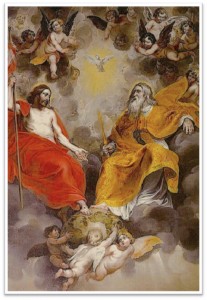We are still on the path that Christ has given Mother Church: eternal life. It takes a long time to accept the fact the God the Father through His Son Jesus nourishes, strengthens, and guides our way through all of life’s challenges. Within human limit we are given grace. The matter is: do recognize the graces? These weeks we are given extensive sections of the Bread of Life discourse; John 6 is our text for meditation.
Accepting that Jesus is THE answer takes a long time
Yesterday, after Mass, I spoke with a friend who is a few years my senior who told me she is now learning what it means ‘to give all to God.’ She freely admits (I can relate to the experience) that she always seems to have a fingernail of reality saved of the self reserved for herself. Thus, she knows that not everything is given to God. The spiritual masters, as we have heard, tell us that we need to abandon everything to the Lord. Yes, all things are given to Christ change; nothing is reserved for the self –absolutely nothing. I find this advice to be true, but rather difficult to live because I always want to keep something for myself. Deep down the difficulty surfaces because I don’t trust enough the relationship I have with the Lord; eternal life is not a merit badge for a life well-lived. In other words: do believe the promises of the Lord are too good to be true?
What I am finding more and more among those who claim to be in relationship, friendship with Christ (i.e., those who claim for themselves to be “good Catholics”) is how shallow said relationship with the Lord really is. What I am finding from people a bunch of alternative reasons NOT to worship Him (the 3rd commandment), not to serve our neighbor (MT 25), not to live in the Mystical Body of Christ –the Church (St Paul), are too prevalent and easy. Too many Catholics are zombies.
The first reading for today’s Mass comes from the Book of Proverbs which tells us that our task in the spiritual life is about ‘forsaking foolishness’. What is foolishness? Foolishness can be seen as anxiety, worry, sin, making excuses, expressed anger, addictions, living with a lack of a pure heart –all leading to being unfaithful and spiritual and human death. Foolishness unworthy of the Eucharist. Only being faithful to Jesus Christ will give us eternal life (permanent life, peace and love, beatific vision –communio with the Trinity). Faithfulness to whom? Only to Jesus Christ will fulfill our hunger for eucharistic living. Only to Jesus in the Holy Eucharist leads us to eternal life. This eucharistic theme is explained by the Holy Father.
Before we get to Pope Francis let us consider what the great Saint Irenaeus taught: “Just as the bread that is made from the earth, when it receives the invocation of God, is no longer ordinary bread but the Eucharist, consisting of two realities, earthly and heavenly, so also our bodies when they receive the Eucharist are no longer corruptible, having the hope of the resurrection to eternity.” Is this what we really believe?
The Sunday Angelus (8/16/15) address by Pope Francis told us today:
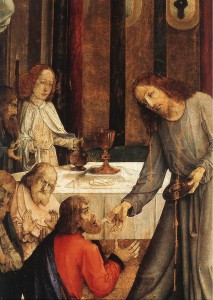 On these Sundays, the Liturgy proposes to us, from the Gospel of John, Jesus’ discourse on the Bread of Life, that is He Himself and that is also the Sacrament of the Eucharist. Today’s passage (Jn. 6, 51-58) presents the last part of that discourse, and refers to some of those among the people who are scandalized because Jesus said: “Whoever eats my flesh and drinks my blood has eternal life, and I will raise him on the last day” (Jn. 6,54).
On these Sundays, the Liturgy proposes to us, from the Gospel of John, Jesus’ discourse on the Bread of Life, that is He Himself and that is also the Sacrament of the Eucharist. Today’s passage (Jn. 6, 51-58) presents the last part of that discourse, and refers to some of those among the people who are scandalized because Jesus said: “Whoever eats my flesh and drinks my blood has eternal life, and I will raise him on the last day” (Jn. 6,54).
The astonishment of those listening is understandable; in fact, Jesus uses the typical style of the prophets to provoke in the people – and also in us – questions and, in the end, to make a decision. The first of the questions is: What does “eat Jesus’ flesh and drink his blood” mean? Is it only an image, a way of saying, a symbol, or does it indicate something real? To answer this, one needs to guess what is happening in Jesus’ heart while he breaks the bread for the hungry crowd. Knowing that He must die on the cross for us, Jesus identifies Himself with that broken and shared bread, and that becomes for Him the “sign” of the Sacrifice that awaits Him. This process culminates in the Last Supper, where the bread and wine truly become His Body and His Blood.
It is the Eucharist where Jesus leaves us a precise purpose: that we can become one with Him. In fact, he says: “Whoever eats my flesh and drinks my blood remains in me and I in him” (v.56). To remain: Jesus in us and us in Him. Communion is assimilation: eating Him, we become Him. But this requires our “yes”, our adherence to the faith.
At times, during the Holy Mass, it may happen to feel this objection: “What is the purpose of the Mass? I go in Church when I feel like it, and I pray better alone.” But the Eucharist is not a private prayer or a beautiful spiritual experience, it is not a simple commemoration of what Jesus has done in the Last Supper: we say, to understand well, that the Eucharist is a “memorial”, that is, an act that actualizes and makes present the event of the death and resurrection of Jesus: the bread is truly His Body given to us; the wine is truly His Blood that has been shed.
The Eucharist is Jesus who gives Himself entirely to us. By nourishing ourselves from Him and remaining in Him through the Eucharistic Communion, if we do it with faith, it transforms our life; it transforms it into a gift to God and a gift to our brothers. To nourish ourselves from that “bread of life” means being in tune with the heart of Christ, to assimilate His choices, His thoughts, His behavior. It means entering into a dynamic of sacrificial love and become a person of peace, of forgiveness, of reconciliation of sharing in solidarity. It is the same as Jesus has done.
Jesus concludes his discourse with these words; “Whoever eats this bread will live forever” (Jn. 6,58). Yes, living in a concrete, real communion with Jesus on this earth makes us pass from death to life. The heavens begin precisely in this communion with Jesus.
In Heaven, Mary our Mother awaits us – yesterday we celebrated this mystery. May She obtain for us the grace of nourishing ourselves always with faith in Jesus, the Bread of Life.
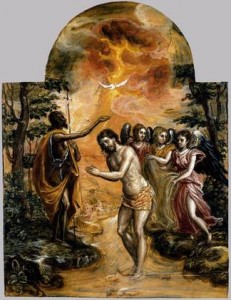 “Whoever is moved by love begins to perceive what “life” really is. He begins to perceive the meaning of the word of hope that we encountered in the Baptismal Rite: from faith I await “eternal life” – the true life which, whole and unthreatened, in all its fullness, is simply life. Jesus, who said that he had come so that we might have life and have it in its fullness, in abundance (cf. Jn 10:10), has also explained to us what “life” means: “this is eternal life, that they know you the only true God, and Jesus Christ whom you have sent” (Jn 17:3). Life in its true sense is not something we have exclusively in or from ourselves: it is a relationship. And life in its totality is a relationship with him who is the source of life. If we are in relation with him who does not die, who is Life itself and Love itself, then we are in life. Then we ‘live’”
“Whoever is moved by love begins to perceive what “life” really is. He begins to perceive the meaning of the word of hope that we encountered in the Baptismal Rite: from faith I await “eternal life” – the true life which, whole and unthreatened, in all its fullness, is simply life. Jesus, who said that he had come so that we might have life and have it in its fullness, in abundance (cf. Jn 10:10), has also explained to us what “life” means: “this is eternal life, that they know you the only true God, and Jesus Christ whom you have sent” (Jn 17:3). Life in its true sense is not something we have exclusively in or from ourselves: it is a relationship. And life in its totality is a relationship with him who is the source of life. If we are in relation with him who does not die, who is Life itself and Love itself, then we are in life. Then we ‘live’”